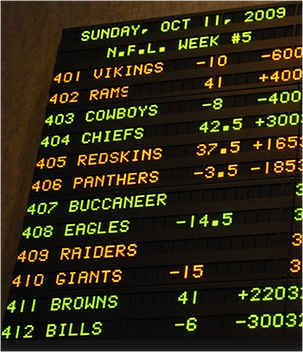"Horse sense is the thing a horse has which keeps it from betting on people" - W.C. Fields
A bookie matches bets. If a bookie sees lopsided interest in bettors taking the Giants by 3 in Sunday’s big game against the Patriots, she’ll ultimately need to adjust the odds she is offering to get a matched book. The instant before the game starts, you could calculate an implied probability for each team winning based upon the bets in the book. Does the bookie care what these specific probabilities are? Absolutely not. Does the bookie even  care which team wins? Not if she’s done her job right. The only thing the bookie cares about is that the sum total of the implied probabilities for the teams adds up to more than 100%. Because the amount over 100% is her vigorish – and that’s how she buys dinner. To borrow a term from asset pricing theory, her position is “risk-neutral”.
care which team wins? Not if she’s done her job right. The only thing the bookie cares about is that the sum total of the implied probabilities for the teams adds up to more than 100%. Because the amount over 100% is her vigorish – and that’s how she buys dinner. To borrow a term from asset pricing theory, her position is “risk-neutral”.
Contrast the bookie now with bettors, who are in a different position entirely. Bettors might conduct fundamental research into the severity of center Ryan Wendell’s sprained ankle, or how wide receiver Victor Cruz’s hamstring is doing. Bettors are obviously interested in the odds and payout from the bookie, but they are concerned as much or more with the real world likelihood that the Pats will win the day. On this latter analysis of the real world rests the core betting decision. It would certainly be wrong to conclude that the bookie held all relevant analysis of the probabilities based on the bets in her book.
Of course, this describes our financial markets as well. Does a vanilla equity options trader care whether the Jan14 40 MSFT calls expire in the money? Not one bit. His money is made regardless of outcome: he runs a matched book functionally identical to the bookie’s. But how about investors who hold a position in those same options? Absolutely they care. And in the case of options there is an important extension to consider. The somewhat radical and at the time very unintuitive conclusion by Fisher Black, Myron Scholes, and Robert Merton, is that for purposes of pricing an equity option, the trader must assume the growth rate of MSFT to be the risk free interest rate. The same “risk-neutral” term again applies: the options are fully hedgable and as such the underlying growth must be assumed to be the risk free rate or arbitrageurs will enter the market and make it so. The investor of course in order to evaluate a buy or sell decision, must examine the real world expected growth rate of MSFT; it is the real world growth that matters. Is there a difference? Over the last 5 years MSFTs annual ROE has averaged about 40.1%. Over the same time 6M Tbills have yielded 0.24% - big difference.
At Intuitive Analytics we welcome the increased application of asset pricing and valuation theory to the municipal market. We believe it is a very positive and constructive development which ultimately can lead to better decisions under uncertainty. At the same time we believe, particularly in light of recent financial history, that the right models be used the right way, for the right reasons and with well-vetted inputs. There is important context to consider in the use of any financial model. Though it might be nice if we all could live in the bookie's world to make our vig, states, municipalities and the dedicated debt managers who serve them live in the real one. They have to take real, unhedged positions; their job is harder.
Comments